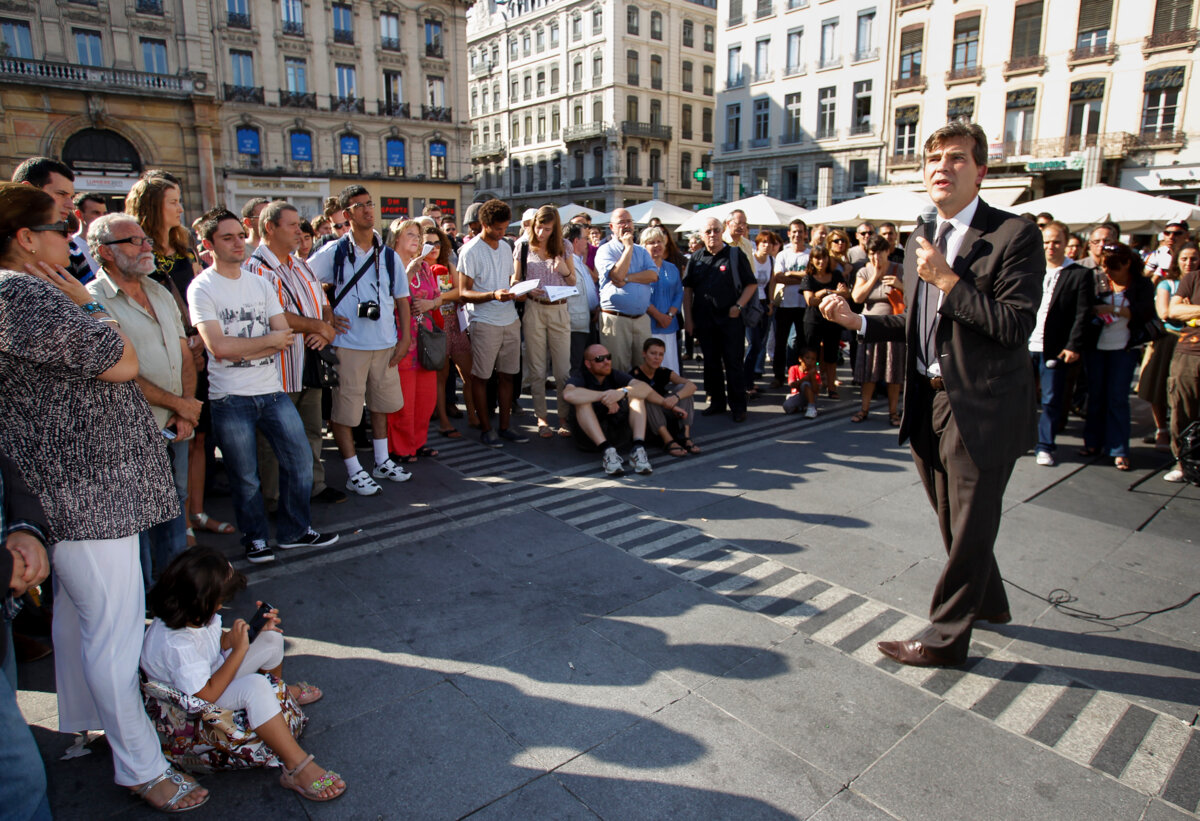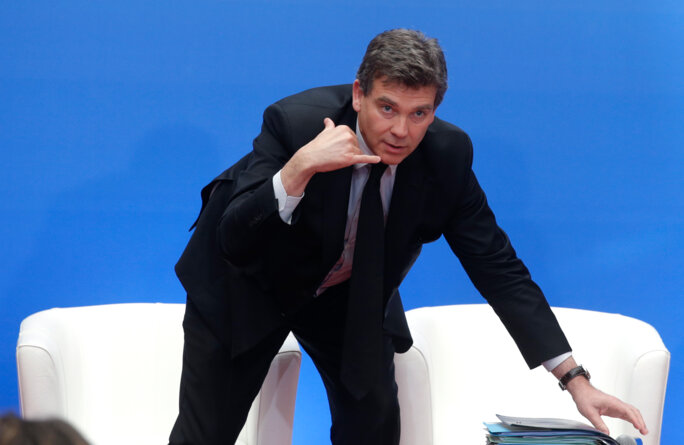He has never made a secret of it: Arnaud Montebourg sees himself as a candidate for the French presidency. Since his abrupt departure from President François Hollande's government in 2014, the former high-profile economy minister has been discreetly taking soundings, discussing and observing. It looks to many as if he is quietly preparing a bid to be the Left's candidate in the 2017 presidential elections.
And yet, nothing has been officially confirmed. Not the nature of any such candidacy, the timetable or even the certainty that he will stand at all. It it too soon, and the political situation is too unclear. Indeed, those close to him are very reluctant to talk to the press, and some even reject the idea that they are working on a possible candidacy. Others who are usually happy to talk request that their comments are off the record or even, in some cases, deny the existence of meetings that they had spoken about just months before.
The reticence of the Montebourg 'team' does not only extend to the media. When he was contacted over an appeal published in Libération urging the holding of a primary election to choose a presidential candidate of the Left for 2017, Arnaud Montebourg did not want to support it. Yet according to French green Euro MP Yannick Jadot, who called the former minister to ask for his backing, “he looks favourably upon the initiative. Whether he is contemplating it himself, I have no idea. He's holding himself back.”
On the face of it Montebourg, who left the government in August 2014 with education minister Benoît Hamon and culture minister Aurélie Filippetti after criticising Hollande's economic policy, is a strong supporter of primary elections. He was one of the people behind the organisation of the 2011 primary to choose a socialist candidate for the following year's election. Montebourg himself came third in the first round of that primary, with 17% of the vote, behind François Hollande and Martine Aubry, but well ahead of Manuel Valls, who is now prime minister.
But this time Montebourg is still hesitating about getting involved in the primary. He fears that in the current political climate it might only help supporters of François Hollande or Manuel Valls, or may simply end up dividing candidates from the alternative left.

Enlargement : Illustration 1

“We're still going to stay very restrained, we're going to wait until all that stabilises,” explains Valentin Przyluski, who was in Montebourg's private office when he was minister for the economy and who remains close to him. But, very discreetly, the organisation of a potential Montebourg bid is gathering pace. A team regularly meets up, working groups have been put in place and Montebourg himself is using his contacts. “He works in groups,” says someone close to him.
The people involved to a greater or lesser extent in the emerging campaign include some former advisors behind his 2011 primary bid and members of his former ministerial private office. They include his old campaign director, Aquilino Morelle, who later worked at the Elysée before being forced to quit following revelations by Mediapart; some members of the collaborative think-tank Plateforme; some figures regularly associated with the former minister, such as essayist and consultant Hakim El Karoui; plus newcomers in the form of political specialist Thomas Guénole and researcher and writer Frédéric Martel.
“In fact I've met Arnaud Montebourg on several occasions, each time with one or two other researchers in a small group,” explains Frédéric Martel. “Aurélie Filippetti also sees intellectuals, writers and researchers. On these occasions I've found Montebourg quite impressive: he reads everyone, takes a deep interest in every issue and I have taken part in several conversations on a variety of fascinating fundamental issues.” However, the academic also says he has the impression that “[Montebourg] is not organising himself politically”.
Within Montebourg's entourage are also several business leaders and figures from the Socialist Party (PS), including Members of Parliament Patrice Prat and Aurélie Filippetti, who is also the former minister's partner. Another person who has joined the entourage is the Paris regional councillor François Kalfon, who helped run the left of centre Gauche Populaire group within the PS, before joining the ranks of the party's 'rebels'. Those close to Montebourg have also had talks with public relations consultant Claude Posternak who recently launched the association La Transition which is seeking to find a 2017 presidential candidate from civic society.
The former minister has stepped up the frequency of his private discussions in the past year. He has met a number of MPs who have been more or less lost to public gaze in recent times, plus leaders in both the PS and the radical left-communist alliance the Front de Gauche, such as 2012 presidential candidate Jean-Luc Mélenchon and Pierre Laurent last summer. “When I saw him we had a very interesting conversation about key issues. He is listening a great deal to the many political figures whom he's meeting,” says Euro MP Guillaume Balas, who is close to Benoît Hamon. Montebourg is also meeting many members of 'civil society', convinced as he is that party political structures are widely discredited in public opinion, particularly among working class voters.
A tight timetable
In essence, Arnaud Montebourg's friends foresee a candidacy that would be critical of François Hollande's politics, but adopting a stance that is less isolated than that of Jean-Luc Mélenchon, who positions himself as the president's only opponent on the Left. They say that the potential candidate's proposals should draw on the bedrock values of the socialist left while at the same time integrating some ideas or positions that are sometimes foreign to it. On the economy, for example, industrial recovery would be given priority over the world of finance. But at the same time the message would be that “we have to free up the country”, says MP Patrice Prat. This serves as a reminder that parts of the recent legislation overseen by current minister for the economy, Emmanuel Macron, which seeks to liberalise sections of the economy, were inspired by his predecessor Montebourg. The same approach would apply to the issue of Europe – Montebourg is far from being a Europhile – the nation and patriotism, of which Montebourg's highly-publicised 'Made in France' campaign as a minister was but one aspect.
“In opinion polls, Arnaud Montebourg comes across as a man opposed to the government's social-liberal line, which plays to the left of the Left, but who is also able to capture some different electoral groups, some Gaullists and some electors who feel distanced from politics,” explains François Kalfon, who presents himself as a “friend” of the former minister. “He has this ability to approach people from a direction that's faithful to the Left while being able to reduce the rift with the working classes.”
“There just aren't 50 credible candidates who can represent a credible alternative and bring about a renewal in practices and ideas,” notes MP Patrice Prat. “We have to be able to surprise when it comes to the ten questions that concern the French people and which have never been sorted out by the Right or Left. I think Arnaud Montebourg would be the best candidate to do that.”

Enlargement : Illustration 2

In some respects, what Montebourg's supporters are outlining borrows from both Jean-Luc Mélenchon and Jean-Pierre Chevènement, a former minister and left-wing nationalist. “Arnaud Montebourg would have a place with us,” says Éric Coquerel, co-president of the Parti de Gauche, co-founded by Mélenchon, when asked about possible agreements on Europe, criticism of establishment elites, appeal to the people or the relationship with the nation.
Montebourg ultimately declined to take part in the launch on February 9th of a new European movement based on the ideas of Yanis Varoufakis, though the former Greek finance minister had attended the French politician's annual summer gathering at Frangy-en-Bresse in eastern France in 2015. But nor did he take part in Mélenchon's gathering in Paris in late January calling for a “Plan B” in relation to Europe.
So far none of this yet adds up to a presidential programme. But it does trace the outline of a political space that Montebourg might want to occupy. The problem is that to further any presidential ambitions for 2017 he has to adapt to a very tight timetable and do so in a very complex and partisan political landscape. To the left of François Hollande there are a number of people hesitating over whether to take part in a primary of the Left: the former green minister Cécile Duflot (who resigned in March 2014), Benoît Hamon, environmental campaigner Nicolas Hulot and communist Pierre Laurent are all thinking about it. Jean-Luc Mélenchon, meanwhile, is already “ready and prepared” for his candidacy.
As things stand, those close to Arnaud Montebourg – who himself declined to answer Mediapart's questions – are divided over the strategy to adopt. Should they simply bypass the PS? Take part in the primary? Yes perhaps, they say, but not a primary of the alternative Left, which would be too narrow. “A gathering of the left wing to the left of Hollande is not enough to win a presidential election,” one of them says. François Kalfon concedes: “The political combination is not easy to find. You have to find the right crossover point. There's a problem over timing between the point when you clarify things politically and the short timetable before the presidential election.”
Above all, to be a candidate you need support and a political dynamic. For Montebourg, who currently works in the private sector as vice-president at Habitat and who is a shareholder in wind power start-up New Wind, a candidacy certainly seems credible for the political figures to whom Mediapart has spoken. “No one is a non-legitimate [candidate], and certainly not him. But we're not there yet,” says Christian Paul, the head of the rebel group within the PS itself.
However, there are quite a few who doubt Montebourg's consistency; he was, after all, among those who manoeuvred to get Manuel Valls – who is on the right of the PS - installed as prime minister in March 2014. They also query his ability to build a lasting political grouping, given that his previous attempts to build structures in his political career have ended in failure.
His stance on the environment – praised at the 2011 primary - has also worried figures in the green movement, Europe Écologie-Les Verts, since his show of support for shale gas while at the economy ministry. “I imagine that he sees himself as a possible candidate. But a pro-shale gas candidate, that's very difficult. And it's a central issue,” says a socialist elected official who asked not to be named. And the Front de Gauche's Clémentina Autain says: “If Arnaud Montebourg were a candidate, the question of the environment would be a problem. I wait to see what he puts forward if he comes back. Perhaps he'll have made progress on these issues?”
In the meantime Montebourg observes and toils away. Like everyone else who is considering being a candidate, he will have to make his decision by the summer at the very latest.
--------------------------------------------------------------------
- The French version of this article can be found here.
English version by Michael Streeter


